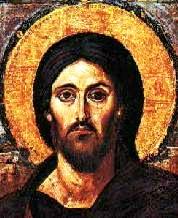Why
did Jesus often refer to himself as the “Son of Man”?
-
 Read Mark 2:23-28. Read Mark 2:23-28. -
Jesus could have
used many titles to describe himself--in his responsibility to Israel.
The one Jesus used the most was a term from the latest of the Old Testament
prophets (like Daniel): Son of Man.
-
The way Jesus
used this title, Son of Man, was to point out the fact that what Jesus
did, we should do also. Jesus was not setting himself up above
others--but alongside them as their Redeemer. Jesus did not
want to impress others--he wanted to teach them. He wanted to show
them the Way in which they could return to full favor with God the Father.
-
As Son of Man,
Jesus represented the very best of human qualities that we should all aspire
to so that we too should become restored Sons and Daughters of the Most
High God.
-
As the Son of
Man, Jesus was down to earth, fairly uncomplex, in showing others how they
should live as God's true children, what they should do and say.
-
The biggest problem
that Jesus had as the Son of Man was the very religious people who had
created a huge gap between the common people and God through all of their
fancy religious rituals and their difficult religious rules. Jesus,
as Son of Man, came to close that gap--even if it meant having to get rid
of all the religious junk that burdened the people. This would not
make Jesus well liked among the very religious of Israel.
Why did Jesus
refer to his miracles as signs?
-
Read all of
John, chapter 2.
-
Why at this wedding
in Cana was Jesus at first unready to offer any help when they ran out
of wine? What do you think caused him to change his mind? What
did he do? Why was his miracle of changing the water into wine taken
as a sign. What was it a sign of?
-
Why then later
did the people of Jerusalem demand of Jesus a sign for him to have
the right to clear out the Temple the way he did? What sign did he
offer? Do you think it had any immediate effect? What were
its long-term effects?
-
What was the effect
of Jesus' other miraculous signs he performed in Jerusalem?
How did Jesus himself feel about these signs?
What was the
relationship of the disciples to Jesus?
-
Read John 6:53-71.
-
Jesus told all
his disciples that if they did not eat his flesh and drink his blood, they
could not have eternal life.
-
What do you think
he meant by these words?
-
Why did so many
of the disciples have a hard time understanding him?
-
What did Jesus
say had to happen before people could understand him?
-
How did Peter
and the rest of the Twelve disciples react?
What were his
expectations of them?
-
Read John 13:34-35.
-
Why was the quality
of their love to be the major identifying feature of them as followers
of Jesus? Why do you think that this was important to Jesus?
How do you suppose a person could ever get such love in their hearts?
-
Read John 14:12-17.
-
Does Jesus really
expect that his disciples will do greater things than he did?
How?
-
How does what
Jesus expects of those who would be his followers always depend on total
faith or trust in God? How else could a person ever achieve such
great things?
-
What part does
the Holy Spirit have in all of this?
Why did Jesus
refer to himself as “the Way, the Truth and the Life”—the only way
to the heavenly Father?
-
Read John 14:6-11.
-
Remember that
it is a trusting love (Greek:
agape: prounounced uh-GAH-pay)
that connects all life: people to God and people to people.
-
What part does
such trusting or agape love play as the Way, Truth and the Life,
the only way to the heavenly Father?
-
How does Jesus
himself represent totally this Way, Truth and Life?
-
Can you think
of any other way to God?
-
Do you think you
understand why Jesus would say that he himself was the Way, Truth and Life--the
only way to the heavenly Father?
|




 Miles
H. Hodges
Miles
H. Hodges